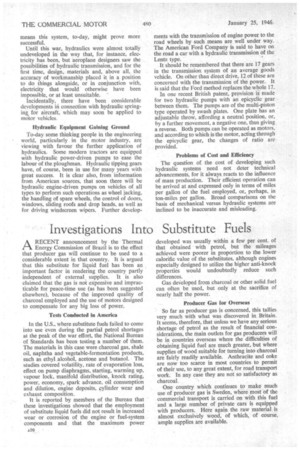Investigations Into Substitute Fuels
Page 22

If you've noticed an error in this article please click here to report it so we can fix it.
ARECENT announcement by the Thermal Energy Commission of Brazil is to the effect that producer gas will continue to be used to a considerable extent in that country. It is argued that this substitute for liquid fuel has been an important factor in rendering the country partly independent of external supplies. It is also claimed that the gas is not expensive and impracticable for peace-time use (as has been suggested elsewhere), because of the improved quality of charcoal employed and the use of motors designed to compensate for any big loss of power.
Tests Conducted in America In the U.S., where substitute fuels failed to come into use even during the partial petrol shortages at the peak of the war effort, the National Bureau of Standards has been testing a number of them. The materials in this case were charcoal gas, shale oil, naphtha and vegetable-fermentation products, such as ethyl alcohol, acetone and butanol. The studies covered volatility, rate of evaporation loss, effect on pump diaphragms, starting, warming up, vapour lock, manifold distribution, knock rating, power, economy, spark advance, oil consumption and dilution, engine deposits, cylinder wear and exhaust composition.
It is reported by members of the Bureau that these investigations showed that the employment of substitute liquid fuels did not result in increased wear or corrosion of the engine or fuel-system components and that the maximum power developed was usually within a few per cent. of that obtained with petrol, but the mileages achieved were poorer in proportion to the lower calorific value of the substitutes, although engines especially designed to utilize the higher anti-knock properties would undoubtedly reduce such differences.
Gas developed from charcoal or other solid fuel can often be used, but only at the sacrifice of nearly half the power.
Producer Gas for Overseas So far as producer gas is concerned, this tallies very much with what was discovered in Britain. It seems, therefore, that unless we have any serious shortage of petrol as the result of financial considerations, the main outlets for gas producers will be in countries overseas where the difficulties of obtaining liquid fuel are much greater, but where supplies of wood suitable for turning into charcoal are fairly readily available. Anthracite and coke are now too scarce in most countries to permit of their use, to any great extent, for road transport work. In any case they are not so satisfactory as charcoal.
One country which continues to make much use of producer gas is Sweden, where most of the commercial transport is carried on with this fuel and a large number of private cars is equipped with producers. Here again the raw material is almost exclusively wood, of which, of course, 'ample supplies are available.




























































